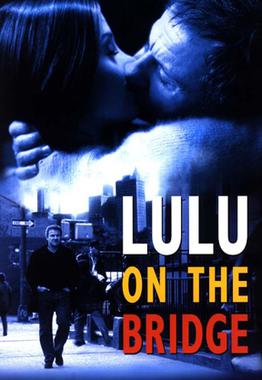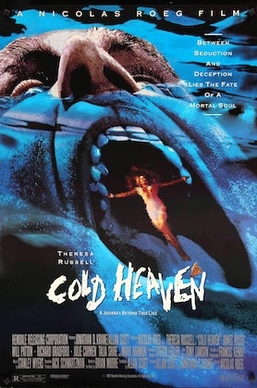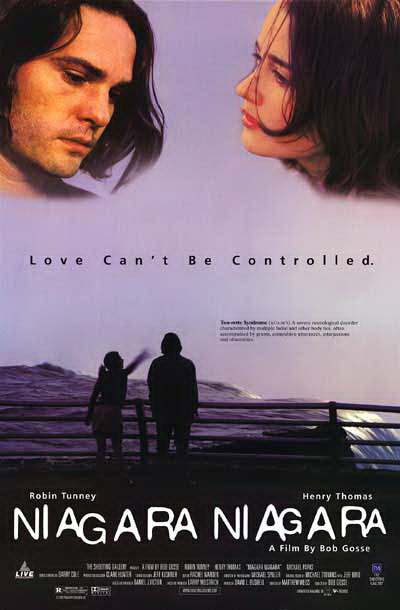
In this edition of “I Wake Up Streaming,” novelist William Boyle rounds up his top streaming picks for the month of May. The column’s name is a play on the 1941 film I Wake Up Screaming, starring Betty Grable, Victor Mature, and Carole Landis. While the film’s title hits a pleasing note of terror and despair, changing that one letter speaks to the joy of discovering new films and rediscovering old favorites, as well as the panic that comes with being overwhelmed by options.
Lulu on the Bridge (YouTube)
 RIP Paul Auster. What a monumental loss. Smoke was a life-changer for me—it came out when I was a junior in high school, and it was my introduction to Auster’s work. Pretty quickly, he became my favorite writer. I read his novels and nonfiction religiously in the years that followed. For a while, no matter how broke I was, he was the only writer whose new book I’d find a way to buy in hardcover on release day. (In the late aughts, I strayed from him a bit, but I returned recently to his work, especially admiring his Stephen Crane bio.) Lulu on the Bridge (1998) was his solo directorial debut (he co-directed Smoke follow-up Blue in the Face with Wayne Wang). I liked it very much back when it came out, but it’d probably been twenty-five years since I last watched it. By ’98, I knew enough of Auster’s work to see his favorite themes on display in Lulu, and I loved the cast (Harvey Keitel, Mira Sorvino, Vanessa Redgrave, Mandy Patinkin, Willem Dafoe, Gina Gershon), but so much must’ve gone right over my head. In the film, Keitel plays Izzy Maurer, a jazz saxophonist who is shot on stage by a deranged madman. When he awakens in the hospital, less one lung, knowing his music career is over, he has an immediate sense that his purpose in life is gone. He returns home. Ambling through the dark Brooklyn streets one night, he encounters a dead body. A bag sits next to the corpse. Izzy takes the bag and heads back to his apartment, sifting through it. The contents include a phone number and a simple stone in an elaborate box. The stone, it turns out, has mystical properties. The phone number leads him to the apartment of Celia Burns (Sorvino), a stranger who happens to have gotten into his music after reading about the shooting. He presses her for information about the stone. Together, they witness the dreamy blue light that it emits and, finally deciding to hold it, realize it has ecstatic properties. They fall helplessly in love. Celia is an aspiring actress—she’s auditioning for a remake of Pandora’s Box that Izzy’s friends happen to be producing and directing. I certainly hadn’t yet seen G. W. Pabst’s silent masterpiece Pandora’s Box back in ’98, a film which I wouldn’t watch until I was in my 30s (when I really started to go deeper on silent pictures). I probably knew Louise Brooks’s name but hadn’t engaged with her films and certainly hadn’t yet read her memoir, Lulu in Hollywood. Anyhow, there are men hunting the strange mystical stone—their purpose and identity are never quite clear. I won’t spoil the rest of the plot. I’ve probably said too much already. The whole thing shouldn’t work, but in the context of Auster’s larger obsessions with parallel existences and chance/coincidence, it absolutely does. It feels very much like his novels, and he’s a damn good director. I’m surprised this film isn’t more well-regarded. It’s a killer Keitel performance (he had a run of killer performances in the ’90s), and Sorvino is magnificent—easily one of her best turns before her career got run off the rails by Weinstein. The movie-within-the-movie scene with Sorvino and Lou Reed is one of my favorite things ever. H/t to James Kenney for the alert that this otherwise difficult-to-see film is on YouTube.
RIP Paul Auster. What a monumental loss. Smoke was a life-changer for me—it came out when I was a junior in high school, and it was my introduction to Auster’s work. Pretty quickly, he became my favorite writer. I read his novels and nonfiction religiously in the years that followed. For a while, no matter how broke I was, he was the only writer whose new book I’d find a way to buy in hardcover on release day. (In the late aughts, I strayed from him a bit, but I returned recently to his work, especially admiring his Stephen Crane bio.) Lulu on the Bridge (1998) was his solo directorial debut (he co-directed Smoke follow-up Blue in the Face with Wayne Wang). I liked it very much back when it came out, but it’d probably been twenty-five years since I last watched it. By ’98, I knew enough of Auster’s work to see his favorite themes on display in Lulu, and I loved the cast (Harvey Keitel, Mira Sorvino, Vanessa Redgrave, Mandy Patinkin, Willem Dafoe, Gina Gershon), but so much must’ve gone right over my head. In the film, Keitel plays Izzy Maurer, a jazz saxophonist who is shot on stage by a deranged madman. When he awakens in the hospital, less one lung, knowing his music career is over, he has an immediate sense that his purpose in life is gone. He returns home. Ambling through the dark Brooklyn streets one night, he encounters a dead body. A bag sits next to the corpse. Izzy takes the bag and heads back to his apartment, sifting through it. The contents include a phone number and a simple stone in an elaborate box. The stone, it turns out, has mystical properties. The phone number leads him to the apartment of Celia Burns (Sorvino), a stranger who happens to have gotten into his music after reading about the shooting. He presses her for information about the stone. Together, they witness the dreamy blue light that it emits and, finally deciding to hold it, realize it has ecstatic properties. They fall helplessly in love. Celia is an aspiring actress—she’s auditioning for a remake of Pandora’s Box that Izzy’s friends happen to be producing and directing. I certainly hadn’t yet seen G. W. Pabst’s silent masterpiece Pandora’s Box back in ’98, a film which I wouldn’t watch until I was in my 30s (when I really started to go deeper on silent pictures). I probably knew Louise Brooks’s name but hadn’t engaged with her films and certainly hadn’t yet read her memoir, Lulu in Hollywood. Anyhow, there are men hunting the strange mystical stone—their purpose and identity are never quite clear. I won’t spoil the rest of the plot. I’ve probably said too much already. The whole thing shouldn’t work, but in the context of Auster’s larger obsessions with parallel existences and chance/coincidence, it absolutely does. It feels very much like his novels, and he’s a damn good director. I’m surprised this film isn’t more well-regarded. It’s a killer Keitel performance (he had a run of killer performances in the ’90s), and Sorvino is magnificent—easily one of her best turns before her career got run off the rails by Weinstein. The movie-within-the-movie scene with Sorvino and Lou Reed is one of my favorite things ever. H/t to James Kenney for the alert that this otherwise difficult-to-see film is on YouTube.
Cold Heaven (Prime Video)
 Elric Kane mentioned Cold Heaven on the Pure Cinema Podcast recently, and I was immediately curious. He talked about it as a Nicolas Roeg missing piece for him. Same here—I’d never even heard of it. I noticed it was on Prime Video but also quickly discovered it was based on a novel by Brian Moore. I’ve read four novels of Moore’s over the years and have been blown away each time—I first discovered him when I found my father-in-law’s coffee-stained copy of The Mangan Inheritance. Despite loving that book and the other three I’ve read (The Lonely Passion of Judith Hearne, The Temptation of Eileen Hughes, and Black Robe), I never did a deep dive into his bibliography. Once I realized that Cold Heaven was based on a Moore novel, I knew I had to read the book first. I tried to order a copy of the Fawcett Crest paperback online, but my order was quickly cancelled—the seller said they no longer had the book in stock. But when I was in Dallas recently, I happened to find the edition I was looking for at Lucky Dog Books. I started reading the book on my flight home, and it consumed me. I finished it in a couple of days, and I’m still in awe of it. I won’t go on and on about the book except to say that it hits like some kind of beautiful combination of Vertigo and The Rapture. It’s searching and haunting and mysterious, leaving so many questions on the table. Just a gorgeous work. I was even more excited to watch the film. I love many of Roeg’s other films, and I especially love Theresa Russell. I could see her as Marie Davenport as I was reading. Maybe I’d feel differently about the film if I hadn’t just read the book, but it was a disappointment. As an adaptation, it abandons far too much of what makes the book work. Stuff that’s necessary is cut in the interest of streamlining, and other significant changes are made that lessen the impact of the story. It becomes muddled, unclear. Roeg really fucks up the ending. A quick word about the plot: as in the book, Marie is a woman who is having an affair—she’s about to break things off with her doctor husband when he’s killed in a freak accident while on vacation. A year prior, while visiting Carmel, Marie—a former Catholic turned atheist—had a vision of the Virgin Mary and has been plagued by nightmares. When her husband pulls a Lazarus, she connects the two. The story winds up being a deep consideration of faith and doubt, marriage and mystery. Russell is terrific—it was surreal to watch this soon after rewatching Ken Russell’s excellent Whore (currently on the Criterion Channel), which also came out in 1991. Will Patton (who’s in The Rapture, by chance) is the only other actor who feels right for the part he’s playing, Father Niles, a priest compelled to get to the heart of Marie’s encounter. Mark Harmon brings real TV movie vibes to the whole thing as Marie’s husband, Alex, a ghostly and transfixing figure in the book, who here becomes merely a sketch of something interesting. I like James Russo in Dangerous Game and other stuff, but he feels totally (and tonally) wrong for the character of Daniel, the man who Marie has been having an affair with—Russo plays him skeezy and aloof, always seeming to strut around in his tighty-whities. There are several compelling nun characters in the book, but we only get one of substance in the film, Talia Shire’s Sister Martha, and she too feels incomplete. While the film fails as an adaptation, I’ve found myself thinking about it quite a bit in recent weeks—the W.B. Yeats poem that Moore took his title from weighs heavily over it in some interesting ways. It is worth watching, especially for Russell, but the book is extraordinary.
Elric Kane mentioned Cold Heaven on the Pure Cinema Podcast recently, and I was immediately curious. He talked about it as a Nicolas Roeg missing piece for him. Same here—I’d never even heard of it. I noticed it was on Prime Video but also quickly discovered it was based on a novel by Brian Moore. I’ve read four novels of Moore’s over the years and have been blown away each time—I first discovered him when I found my father-in-law’s coffee-stained copy of The Mangan Inheritance. Despite loving that book and the other three I’ve read (The Lonely Passion of Judith Hearne, The Temptation of Eileen Hughes, and Black Robe), I never did a deep dive into his bibliography. Once I realized that Cold Heaven was based on a Moore novel, I knew I had to read the book first. I tried to order a copy of the Fawcett Crest paperback online, but my order was quickly cancelled—the seller said they no longer had the book in stock. But when I was in Dallas recently, I happened to find the edition I was looking for at Lucky Dog Books. I started reading the book on my flight home, and it consumed me. I finished it in a couple of days, and I’m still in awe of it. I won’t go on and on about the book except to say that it hits like some kind of beautiful combination of Vertigo and The Rapture. It’s searching and haunting and mysterious, leaving so many questions on the table. Just a gorgeous work. I was even more excited to watch the film. I love many of Roeg’s other films, and I especially love Theresa Russell. I could see her as Marie Davenport as I was reading. Maybe I’d feel differently about the film if I hadn’t just read the book, but it was a disappointment. As an adaptation, it abandons far too much of what makes the book work. Stuff that’s necessary is cut in the interest of streamlining, and other significant changes are made that lessen the impact of the story. It becomes muddled, unclear. Roeg really fucks up the ending. A quick word about the plot: as in the book, Marie is a woman who is having an affair—she’s about to break things off with her doctor husband when he’s killed in a freak accident while on vacation. A year prior, while visiting Carmel, Marie—a former Catholic turned atheist—had a vision of the Virgin Mary and has been plagued by nightmares. When her husband pulls a Lazarus, she connects the two. The story winds up being a deep consideration of faith and doubt, marriage and mystery. Russell is terrific—it was surreal to watch this soon after rewatching Ken Russell’s excellent Whore (currently on the Criterion Channel), which also came out in 1991. Will Patton (who’s in The Rapture, by chance) is the only other actor who feels right for the part he’s playing, Father Niles, a priest compelled to get to the heart of Marie’s encounter. Mark Harmon brings real TV movie vibes to the whole thing as Marie’s husband, Alex, a ghostly and transfixing figure in the book, who here becomes merely a sketch of something interesting. I like James Russo in Dangerous Game and other stuff, but he feels totally (and tonally) wrong for the character of Daniel, the man who Marie has been having an affair with—Russo plays him skeezy and aloof, always seeming to strut around in his tighty-whities. There are several compelling nun characters in the book, but we only get one of substance in the film, Talia Shire’s Sister Martha, and she too feels incomplete. While the film fails as an adaptation, I’ve found myself thinking about it quite a bit in recent weeks—the W.B. Yeats poem that Moore took his title from weighs heavily over it in some interesting ways. It is worth watching, especially for Russell, but the book is extraordinary.
Niagara, Niagara (Vudu Free)
 Directed by Bob Gosse, 1997’s Niagara, Niagara is a product of his great indie production company, The Shooting Gallery. Two shoplifters—Robin Tunney’s Marcy and Henry Thomas’s Seth—meet cute while stealing from a store. Marcy has Tourette syndrome and works for her family’s sanitation company. Seth lives with his abusive old man who eats nothing but Corn Flakes. They decide to hit the road for Toronto to score a black Bobbi styling head (a Barbie knockoff of some kind), which Marcy desperately wants to practice makeup and hair on. They fall for each other, of course. Misfits, outsiders, wanderers finally with some sense of belonging and purpose. Not long into the trip, Marcy needs her pills, which leads to trouble. A pharmacy heist gone wrong. A crashed car. Walter, a tow truck driver played by Michael Parks, comes along to help them. Like Kit and Holly with their treehouse in the woods in Badlands, Marcy and Seth get a small taste of paradise. Seth, in particular, because of his bad dad situation, is drawn in by Walter’s kindness. But then things go off course again as Marcy has a violent outburst. The film was shot in and around Poughkeepsie, New Paltz, and Highland, New York (I lived in New Paltz for the better part of a decade), but the geography isn’t reliant on reality. Though there’s an exterior shot of the Dutchess Mall at some point and plenty of Hudson Valley locales, Marcy suggests that the closest big city is in Canada. (If they were in Dutchess County, they’d be only ninety miles from NYC.) The name of the town they start in is the fictional Broken Arrow. After that, as they decide to trek to Toronto, geography gets even hazier. As the title of the movie suggests, they eventually wind up at Niagara Falls and then bus it into Toronto for the finale. Starts weird and—to its great credit—gets weirder as it goes. Takes many unpredictable turns, some more satisfying than others. Feels loose, almost improvised, at times. Tunney is wonderful (she won Best Actress at the Venice Film Festival for this performance), and Thomas is great too, but Parks absolutely steals it. The film suffers from his absence when he’s not on screen. The soundtrack is terrific, including songs by Gillian Welch, Patty Griffin, and Lucinda Williams. Ultimately, it does feel like a mix of some of its obvious influences (Badlands, Drugstore Cowboy, Bonnie and Clyde, and other lovers-on-the-lam movies), but it’s much more in line with the work of Hal Hartley (TSG Pictures distributed Henry Fool, and Gosse starred in Hartley’s short Theory of Achievement). It’s also close in spirit to films like Buffalo ’66 and Kwik Stop, both of which it predates. Strange, dark, and funny.
Directed by Bob Gosse, 1997’s Niagara, Niagara is a product of his great indie production company, The Shooting Gallery. Two shoplifters—Robin Tunney’s Marcy and Henry Thomas’s Seth—meet cute while stealing from a store. Marcy has Tourette syndrome and works for her family’s sanitation company. Seth lives with his abusive old man who eats nothing but Corn Flakes. They decide to hit the road for Toronto to score a black Bobbi styling head (a Barbie knockoff of some kind), which Marcy desperately wants to practice makeup and hair on. They fall for each other, of course. Misfits, outsiders, wanderers finally with some sense of belonging and purpose. Not long into the trip, Marcy needs her pills, which leads to trouble. A pharmacy heist gone wrong. A crashed car. Walter, a tow truck driver played by Michael Parks, comes along to help them. Like Kit and Holly with their treehouse in the woods in Badlands, Marcy and Seth get a small taste of paradise. Seth, in particular, because of his bad dad situation, is drawn in by Walter’s kindness. But then things go off course again as Marcy has a violent outburst. The film was shot in and around Poughkeepsie, New Paltz, and Highland, New York (I lived in New Paltz for the better part of a decade), but the geography isn’t reliant on reality. Though there’s an exterior shot of the Dutchess Mall at some point and plenty of Hudson Valley locales, Marcy suggests that the closest big city is in Canada. (If they were in Dutchess County, they’d be only ninety miles from NYC.) The name of the town they start in is the fictional Broken Arrow. After that, as they decide to trek to Toronto, geography gets even hazier. As the title of the movie suggests, they eventually wind up at Niagara Falls and then bus it into Toronto for the finale. Starts weird and—to its great credit—gets weirder as it goes. Takes many unpredictable turns, some more satisfying than others. Feels loose, almost improvised, at times. Tunney is wonderful (she won Best Actress at the Venice Film Festival for this performance), and Thomas is great too, but Parks absolutely steals it. The film suffers from his absence when he’s not on screen. The soundtrack is terrific, including songs by Gillian Welch, Patty Griffin, and Lucinda Williams. Ultimately, it does feel like a mix of some of its obvious influences (Badlands, Drugstore Cowboy, Bonnie and Clyde, and other lovers-on-the-lam movies), but it’s much more in line with the work of Hal Hartley (TSG Pictures distributed Henry Fool, and Gosse starred in Hartley’s short Theory of Achievement). It’s also close in spirit to films like Buffalo ’66 and Kwik Stop, both of which it predates. Strange, dark, and funny.
William Boyle is the author of the novels Gravesend, The Lonely Witness, A Friend Is a Gift You Give Yourself, City of Margins, Shoot the Moonlight Out, and Saint of the Narrows Street (coming in February 2025 from Soho Crime). His novella Everything Is Broken was published in Southwest Review Volume 104, numbers 1–4, and he co-edited (with Claudia Piñeiro and Frances Riddle) the noir issue (Volume 108, number 3). His website is williammichaelboyle.com.
Illustration: Jess Rotter
